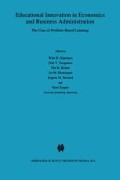Abstract
If economics were to be a science like physics, its instruction would include labs. If economics were to be a branch of mathematics, its instruction may stress problem solving. But what if economics represents a way of thinking? What if learning economics is more like learning a language?
Access this chapter
Tax calculation will be finalised at checkout
Purchases are for personal use only
Preview
Unable to display preview. Download preview PDF.
References
Boynton, G. R. & Deissenberg, Christophe (1987). Models of the Economy Implicit in Economic Discourse. Policy Sciences, 20, 2, 129–151.
Blundell, William (1986). The Art and Craft of Feature Writing. New York: Pengu in Group.
Eizenstat, S. (1992). Economists and White House Decisions. Journal of Economic Perspectives, Summer, 65–72.
Cordes, J., Klamer, Arjo, & Leonard, Thomas C. (1993). Academic Rhetoric in the Policy Arena: The Case of Capital Gains Taxation. Eastern Economic Journal, Fall, 459–79. Foucault, Michael (1973). The Order of Things. New York: Vintage Books.
Foucault, Michael (1972). The Archeology of Knowledge. New York: Pantheon Books. Klamer, Arjo & Colander, David (1990). The Making of an Economist. Boulder: Westview Press.
Klamer, Arjo & Leonard, Thomas C. (1994). Sa What’s an Economic Metaphor? In Philip
Mirowski (Ed.), Natural Images. New York: Cambridge University Press.
Klamer, Arjo, McCloskey, Donald M., & Solow, Robert M. (1987). The Consequences of Economic Rhetoric. New York: Cambridge University Press.
Kuhn, Thomas ( 1962, 1970). The Structure of Scientific Revolutions. Second enlarged edition. Chicago: University of Chicago Press, 1970.
Kuhn, Thomas (1979). Metaphor in Science. In Andrew Ortony (Ed.), Metaphor and Thought. New York: Cambridge University Press.
Lakatos, Imre (1968). Criticism and the Methodology of Scientific Research Programmes. Proceedings of the Aristotelian Society, 69, 149–86.
Leyonhufvud, Axel (1973). Life among the Econ. Western Economic Journal.
McCloskey, Donald M (1984). The Rhetoric of Economics. Madison: University of Wiscons in Press.
McCloskey, Donald M (1990). If You’re So Smart: The Narrative of Economic Expertise. Chicago: University of Chicago Press.
Mirowski, Philip (1989). More Heat than Light.. New York: University of Cambridge Press.
Pepper, Stephen S. (1942).World Hypotheses. Berkeley: University of California Press. Rivlin, A (1987). Economics and the Political Process. American Economic Review March 1–10.
Schon, Donald, A. (1967). The Invention and Evolution of Ideas. London: Social Science Paperbacks. (Originally published in 1963 as Displacement of Concepts. London: Tavistock Publications).
Schon, Donald, A. (1979). Generative Metaphor: A Perspective on Problem-Setting in Social Policy. In Andrew Ortony (Ed.), Metaphor and Thought. New York: Cambridge University Press.
Smith, Adam (1776). An Inquiry into the Nature and Causes of The Wealth of Nations. Edited by Edwin Cannan. Chicago: University of Chicago Press, 1976.
Author information
Authors and Affiliations
Editor information
Editors and Affiliations
Rights and permissions
Copyright information
© 1995 Springer Science+Business Media Dordrecht
About this chapter
Cite this chapter
Klamer, A. (1995). Rhetorical Obstacles In The Teaching Of Economics. In: Gijselaers, W.H., Tempelaar, D.T., Keizer, P.K., Blommaert, J.M., Bernard, E.M., Kasper, H. (eds) Educational Innovation in Economics and Business Administration. Educational Innovation in Economics and Business, vol 1. Springer, Dordrecht. https://doi.org/10.1007/978-94-015-8545-3_2
Download citation
DOI: https://doi.org/10.1007/978-94-015-8545-3_2
Publisher Name: Springer, Dordrecht
Print ISBN: 978-90-481-4504-1
Online ISBN: 978-94-015-8545-3
eBook Packages: Springer Book Archive

